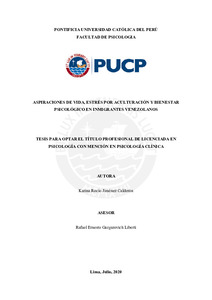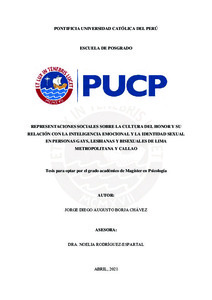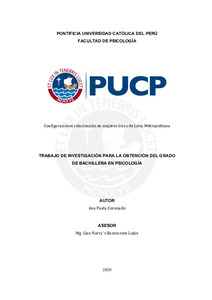| dc.contributor.advisor | Gargurevich Liberti, Rafael Ernesto | |
| dc.contributor.author | Jiménez Calderón, Karina Rocío | |
| dc.date.accessioned | 2020-10-21T21:12:08Z | |
| dc.date.available | 2020-10-21T21:12:08Z | |
| dc.date.created | 2020 | |
| dc.date.issued | 2020-10-21 | |
| dc.identifier.uri | http://hdl.handle.net/20.500.12404/17344 | |
| dc.description.abstract | En la presente investigación se estudió la relación entre aspiraciones de vida, estrés por
aculturación y bienestar psicológico en un grupo de 349 inmigrantes venezolanos de
ambos sexos que residen en Lima (con edades entre 18 y 59 años). Los participantes
respondieron el Índice de aspiraciones versión reducida (Duriez et al., 2007), la Escala de
Estrés por Aculturación (Ruiz-Hernández et al., 2011) y la Escala de Bienestar
psicológico (Díaz et al., 2006). Los resultados muestran que las Aspiraciones intrínsecas
es la variable predictora más frecuente de las subescalas de bienestar psicológico, y la que
muestra los coeficientes de regresión más altos (con excepción de la predicción de la
subescala de Autonomía). No se halló una relación significativa entre Aspiraciones
extrínsecas y bienestar psicológico. Por otro lado, se encontró que la subescala de
Discriminación y rechazo percibido es un predictor negativo de Autoaceptación, mientras
que la subescala de Problemas de ciudadanía y legalidad lo es de Crecimiento personal.
También, se halló que las subescalas de Distancia de lugar de origen y Ruptura familiar
son predictores negativos de Relaciones positivas con otros. Por último, el grado de
instrucción constituye un predictor positivo de tres subescalas de bienestar psicológico
(Autonomía, Crecimiento personal y Propósito en la vida). Se discuten las implicancias
de estos resultados para la población de inmigrantes venezolanos, rescatándose la
relevancia de identificar aquellos factores que contribuyen y que obstaculizan su
adaptación a un nuevo contexto sociocultural. | es_ES |
| dc.description.abstract | This research studies the relationship between life aspirations, acculturative stress and
psychological wellbeing for a group of 349 Venezuelan immigrants, both men and
woman, who live in Lima (of ages between 18 and 59 years old). Participants answered
a shortened version of the Index of Life Aspirations (Duriez et al., 2007), the
Acculturative Stress Scale (Ruiz-Hernández et al., 2011) and the Psychological Wellbeing
Scale (Díaz et al., 2006). Results show that Intrinsic aspirations is the most frequent
predicting variable of the subscales of psychological well-being and acts as negative
predictor of Positive relationship with others. variable with the highest regression
coefficients (with Autonomy prediction as an exception). Besides, a significant
relationship between Extrinsic aspirations and subescales of psychological well-being
wasn’t found. On the other hand, the subscale of Perception of discrimination and
rejection acts as a negative predictor of Self-acceptance, while la subscale of Citizenship
problems and legality had a similar relation with Personal growth. As well, the subscales
of Distance from the hometown, and Family break. Lastly, the instruction level acts as a
positive predictor for three subscales of psychological wellbeing (Autonomy, Personal
growth and Purpose in life). The implications of these results for the population of
Venezuelan immigrants are discussed, rescuing the relevance of identifying those factors
that contribute and hinder their adaptation to a new sociocultural context. | es_ES |
| dc.language.iso | spa | es_ES |
| dc.publisher | Pontificia Universidad Católica del Perú | es_ES |
| dc.rights | info:eu-repo/semantics/openAccess | es_ES |
| dc.rights.uri | http://creativecommons.org/licenses/by/2.5/pe/ | * |
| dc.subject | Migrantes--Aspectos psicológicos | es_ES |
| dc.subject | Aculturación--Aspectos psicológicos | es_ES |
| dc.subject | Bienestar--Aspectos psicológicos | es_ES |
| dc.subject | Asimilación cultural--Aspectos psicológicos | es_ES |
| dc.subject | Migración e inmigración--Perú | es_ES |
| dc.subject | Migración e inmigración--Venezuela | es_ES |
| dc.title | Aspiraciones de vida, estrés por aculturación y bienestar psicológico en inmigrantes venezolanos | es_ES |
| dc.type | info:eu-repo/semantics/bachelorThesis | es_ES |
| thesis.degree.name | Licenciado en Psicología con mención en Psicología Clínica | es_ES |
| thesis.degree.level | Título Profesional | es_ES |
| thesis.degree.grantor | Pontificia Universidad Católica del Perú. Facultad de Psicología | es_ES |
| thesis.degree.discipline | Psicología con mención en Psicología Clínica | es_ES |
| renati.advisor.orcid | https://orcid.org/0000-0001-6346-4134 | es_ES |
| renati.discipline | 313026 | es_ES |
| renati.level | https://purl.org/pe-repo/renati/level#tituloProfesional | es_ES |
| renati.type | http://purl.org/pe-repo/renati/type#tesis | es_ES |
| dc.publisher.country | PE | es_ES |
| dc.subject.ocde | https://purl.org/pe-repo/ocde/ford#5.01.00 | es_ES |









